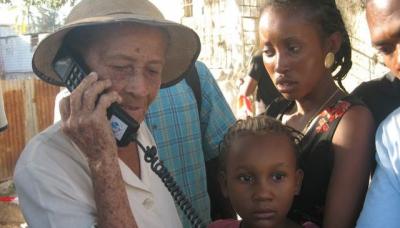Haiti Disaster Satellite Wins UK Engineering Prize

Inmarsat’s BGAN service has been praised for its humanitarian applications by the Royal Academy of Engineering
Satellite provider Inmarsat has been awarded the UK’s most prestigious prize for engineering innovation, thanks in part to its role in providing communications to disaster zones around the world.
Announced this week, the MacRobert Award from the Royal Academy of Engineering recognised Inmarsat for its Broadband Global Area Network (BGAN) service. In a statement, the Royal Academy made special reference to the role the technology played in helping to provide connectivity for aid agencies and victims of the earthquake in Haiti in January.
For example, on the 20 January, a few days after the Haiti earthquake struck, 137 BGAN terminals were sending and receiving data while also supporting 35 telephone conversations. In just that one day, the system allowed around 36,054 minutes of communication to take place, according to the academy statement.
Deployed In Haiti
Commenting on the award, Dr Geoff Robinson, chairman of the MacRobert Award judging panel said Inmarsat had to overcome significant engineering challenges to launch the service and praised the company for the humanitarian benefits it offers. “That their service can deliver such tremendous humanitarian benefits, in addition to the technical and commercial ones, must be a source of great satisfaction to this outstanding team,” he said.
The BGAN service was launched in 2005 and has involved around £1.5billion worth of investment by the company. BGAN is the only simultaneous voice and 0.5Mbps data service available anywhere on the planet, at a reasonable cost, using satellite terminals the size of laptops, the academy states.
 Emergency telecoms group Telecoms Sans Frontieres (TSF) was one of the first organisations to use Inmarsat’s BGAN technology in Haiti. TSF deployed a 3-man team from its Latin American base in Managua, Nicaragua equipped with satellite mobile and fixed telecoms tools including Inmarsat BGAN or R-BGAN terminals. The team’s initial role was to help with the coordination of the aid effort by establishing communications between the various aid groups on the ground, including the United Nations Office for the Coordination of Humanitarian Affairs (OCHA) and the European Commission’s Humanitarian Aid Department (ECHO).
Emergency telecoms group Telecoms Sans Frontieres (TSF) was one of the first organisations to use Inmarsat’s BGAN technology in Haiti. TSF deployed a 3-man team from its Latin American base in Managua, Nicaragua equipped with satellite mobile and fixed telecoms tools including Inmarsat BGAN or R-BGAN terminals. The team’s initial role was to help with the coordination of the aid effort by establishing communications between the various aid groups on the ground, including the United Nations Office for the Coordination of Humanitarian Affairs (OCHA) and the European Commission’s Humanitarian Aid Department (ECHO).
Based On 3G Technology
According to the Royal Academy, Inmarsat uses 3G to provide its BGAN service. “The 3G standard, developed for ground-based telephony, had to be significantly adapted for delivery from satellites at 35,600km from the earth, and Inmarsat took a calculated risk in committing to 3G a year before it was formally approved. The risk has paid off, with Inmarsat’s first-quarter results this year showing that revenue soared by nearly 12 percent to £187.4 million,” the academy states.
Earlier this year, surrey-based satellite manufacturer SSTL was granted one of the initial contracts to build the long-awaited European Galileo satellite network – a rival to the US GPS service.